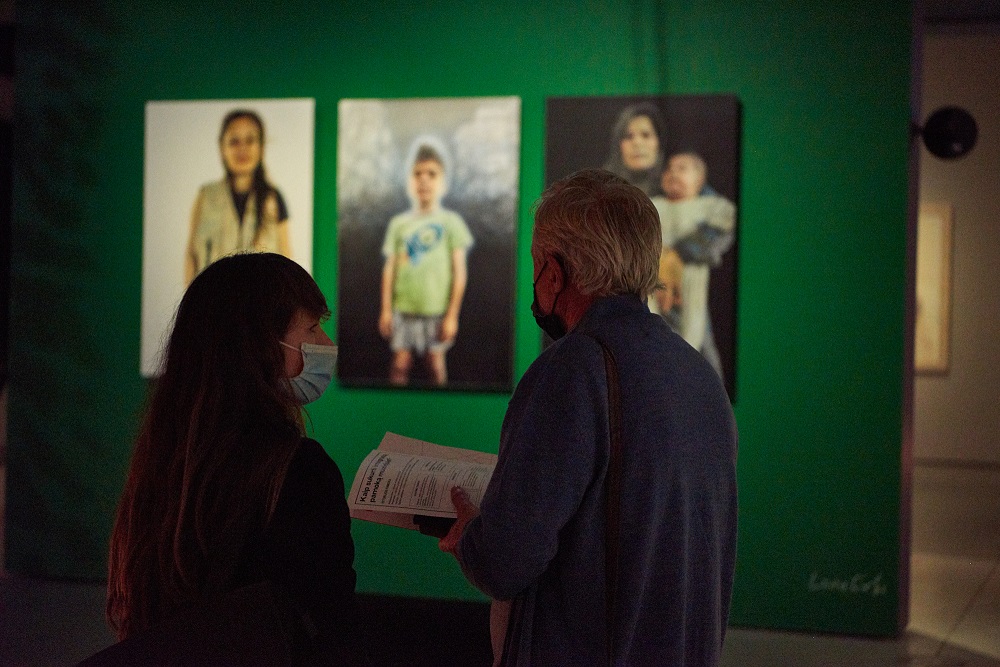Remote learning: children’s anxiety and emerging behavioural problems. What do psychologists advise?

Remote learning, which has become a new reality, poses challenges for both teachers and children. With this in mind, we invited teachers to a conference “The Reality of Remote Learning: What Can the Museum Offer Teachers?”.
The conference presented not only various opportunities for teachers to create integrated lessons using a virtual collection and online content presented by MO Museum but also issues of problematic behaviour and emotion management of children, which was analysed together with psychologists Aušra Kurienė and Ieva Dulinskaitė.
“This year we all faced a new reality of remote learning and remote work. So, while organizing this year’s conference for teachers, we wanted to emphasize most of what the museum can do in this situation and what it can offer teachers: online content, education and other activities. We also wanted to analyse the problems and challenges of working and learning remotely together with teachers and psychologists”, says Milda Ivanauskienė, Director at MO Museum, which organized the conference.
So, what challenges do children and teachers face when working remotely and how can these problems be addressed?
Adults have various life-acquired mechanisms for dealing with anxiety, and children only have adults who tell them how it will be.
Remote learning is worrying for children
Modern children have a great deal of anxiety, which is only exacerbated by unpredictability. Remote learning and quarantine is one of the unpredictable aspects – children do not know when it will end, they do not imagine what will happen next. Although it may seem unexpected, as psychologists Aušra Kurienė and Ieva Dulinskaitė admit, school is one of the most stable places in a child’s life.
“Adults have various life-acquired mechanisms for dealing with anxiety, and children only have adults who tell them how it will be”, says A. Kurienė.
“During quarantine and remote learning, children like us all experience a lot of feelings. And it doesn’t matter if the child shows those feelings with their behaviour or not. The most important thing is to help him or her name what they feel in these turbulent times”, says I. Dulinskaitė.
At moments, they may feel fear, anxiety, worry, a sense of loss, not being able to go to regular circles, socializing with friends, they may experience anger, sadness, and a sense of loneliness.
There is not a single child who intentionally starts to behave problematically.
Children do not intentionally engage in problematic behaviour
“There is not a single child who intentionally starts to behave problematically. Every problematic behaviour that we adults treat as a problem accommodates a child’s internal problem, which we do not always understand”, says psychologist Aušra Kurienė.
It is easiest for parents and adults to recognize behavioural problems directed outwards, but psychologists note that we need to be equally attentive and care about both external and internal behaviours.
“We don’t like outward-looking actions, aggressive actions directed at someone the most. However, what we often do not see is problematic behaviour directed at ourselves – apathy, sadness, inner anxiety, self-contempt, ”says psychologist A. Kurienė.
What causes problematic behaviour?

A. Kurienė states that often the situations themselves create an environment in which the child shows misbehaviour.
“A tired child will not be able to calm down quickly, a bored child will inevitably think of something to do. Child misbehaviour can also be caused by being overburdened. Responsible and extremely responsible children are simply sincerely tired and they can start behaving in a way that parents or other adults consider to be inappropriate”, says the psychologist.
She adds that problematic behaviour is also caused by unclear rules and the consequences of not following them. “Both the rules and the consequences must be clear for us to follow. It is the teacher’s duty to remind the child of the rules of appropriate behaviour in case of misbehaviour”, says A. Kurienė.
The psychologist points out that children behave differently at different stages of development and this should not surprise us. Here, however, she adds that misconduct due to developmental subjects requires specialist support and no teacher can be left alone in such situation.

Attention – the unmet psychological need
A desire for attention can also lead to child misbehaviour, but this desire for attention should not be seen as a flaw.
“We all want attention. Attention is an absolutely fundamental need. Some children have missed attention. Don’t make a mistake – they don’t need that attention anymore, they just haven’t received it like others. And they are very insecure, so with their behaviour, they try to feel safe”, says A. Kurienė.
According to A. Kurienė, such unsafe children, who, for example, do not understand a subject, will better choose not to write a test, will receive comments about bad behaviour, but will not receive a bad evaluation and will retain the illusion that they are not stupid and do not understand.
The psychologist points out that by misbehaving, children do not have the goal of irritating adults or becoming unpopular. “Children behave inappropriately due to their unmet psychological needs and first we need to try to understand what is going on inside the child and why he or she is behaving in this way, and then we will know what to do,” says A. Kurienė.
Attention is an absolutely fundamental need. Some children have missed attention. Don’t make a mistake – they don’t need that attention anymore, they just haven’t received it like others.

What to do?

Psychologists A. Kurienė and I. Dulinskaitė admit that adults can really help a child by changing situations that cause their problematic behaviour.
We can start with small things – a clear discussion of the rules, clear instructions that must be positively formulated and indicate what to do and not to do, the child must be praised and encouraged for good behaviour, it is necessary to notice his or her small steps.
It is also crucial to accept the child’s characteristics, learn problem-solving skills, try to discover and learn about the child’s strengths and nurture them, and most importantly – Involve the child in activities and make him/her feel useful and necessary.
“Nowadays, it is very important for children to confirm that adults hear them and understand how they feel. So it is necessary to encourage children to talk”, adds I. Dulinskaitė.
Relevant topics for teachers every year
A conference specifically for teachers is being held at MO Museum for the second time and is dedicated to teachers at MO Museum’s Teacher’s Pass community.
All schools can join this community, and teachers in the schools who have a Teacher’s Pass are given the opportunity to visit the exhibitions free of charge and to integrate the content of the exhibitions into the lessons.